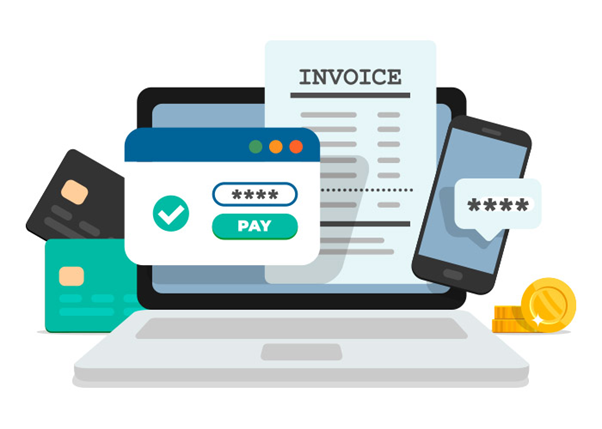In today’s fast-paced business environment, small businesses need efficient tools to stay competitive. Enter Odoo ERP, an all-in-one solution that’s transforming how small businesses operate.
Toc
Introduction of Odoo ERP
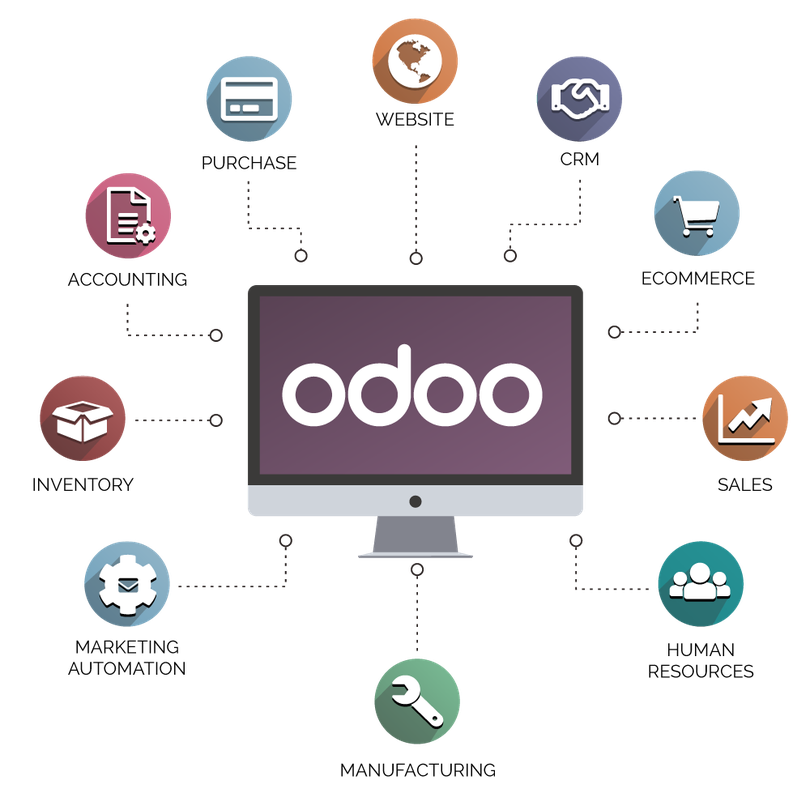
Odoo ERP offers a comprehensive suite of applications tailored to meet the diverse needs of small businesses. From sales and inventory management to accounting and customer relationship management, Odoo integrates all these functions within a single platform. This integration streamlines operations, reduces redundancy, and enhances overall productivity. The flexibility and scalability of Odoo ERP also allow small businesses to customize the system according to their unique requirements, ensuring a perfect fit as they grow and evolve.
Overview of Odoo and its core products
At the heart of Odoo ERP lies a collection of core products designed to address the critical functions of small businesses. These include:
- Sales Management: Odoo’s sales module helps businesses streamline their sales operations, track customer interactions, and manage orders with ease. The module provides a complete overview of the sales pipeline, empowering sales teams to close deals faster.
- Inventory Management: Efficient inventory control is vital for any business. Odoo’s inventory module offers real-time insights into stock levels, automates reordering processes, and integrates seamlessly with other modules like sales and manufacturing to ensure optimal stock management.
- Accounting: Financial health is crucial for sustained business growth. Odoo’s accounting module simplifies financial management, offering features such as invoicing, expense tracking, and financial reporting. It ensures compliance with financial regulations and provides accurate insights into the company’s financial position.
- Customer Relationship Management (CRM): Building strong customer relationships is paramount. Odoo’s CRM system helps businesses maintain detailed customer records, track interactions, and manage follow-up activities. It aids in nurturing leads and enhancing customer retention.
Each of these core products can be further customized to suit specific business needs, ensuring that Odoo ERP remains a highly adaptive and functional tool as businesses evolve.
Who might need Odoo ERP
Odoo ERP is ideal for a wide range of small to medium-sized enterprises (SMEs) that are looking to streamline operations and increase efficiency. Businesses facing challenges in managing disparate systems for sales, inventory, accounting, and customer management will find Odoo ERP particularly beneficial. Startups can leverage Odoo’s modular nature to implement essential functions and gradually scale up as they grow, while established companies can use it to replace outdated or inefficient systems. Industries such as retail, manufacturing, services, and e-commerce can all benefit from Odoo’s comprehensive functionalities that cater to their specific operational needs. Additionally, companies aiming to improve their decision-making processes through real-time data insights and automation will find Odoo ERP an invaluable tool in their arsenal.
Benefits of Implementing Odoo ERP
The implementation of Odoo ERP offers numerous advantages that can significantly improve the efficiency and productivity of small businesses:
- Centralized Data Management: By integrating all business functions into a single platform, Odoo ERP ensures that data is consistent, accurate, and easily accessible, reducing the need for manual data entry and decreasing the risk of errors.
- Improved Operational Efficiency: Automation of routine tasks such as invoicing, inventory reordering, and follow-up activities frees up valuable time for employees to focus on more strategic initiatives.
- Enhanced Collaboration: With all departments using a unified system, communication and collaboration across teams are greatly improved, fostering a more cohesive work environment.
- Scalability and Flexibility: Odoo ERP is designed to grow with businesses. Its modular structure allows companies to add new functionalities and scale their operations without significant overhauls.
- Cost-Effectiveness: Compared to traditional ERP systems, Odoo ERP offers a more affordable solution without compromising on features and functionalities. Its open-source nature allows for cost-effective customization and deployment.
Key Features of Odoo for Small Business Success
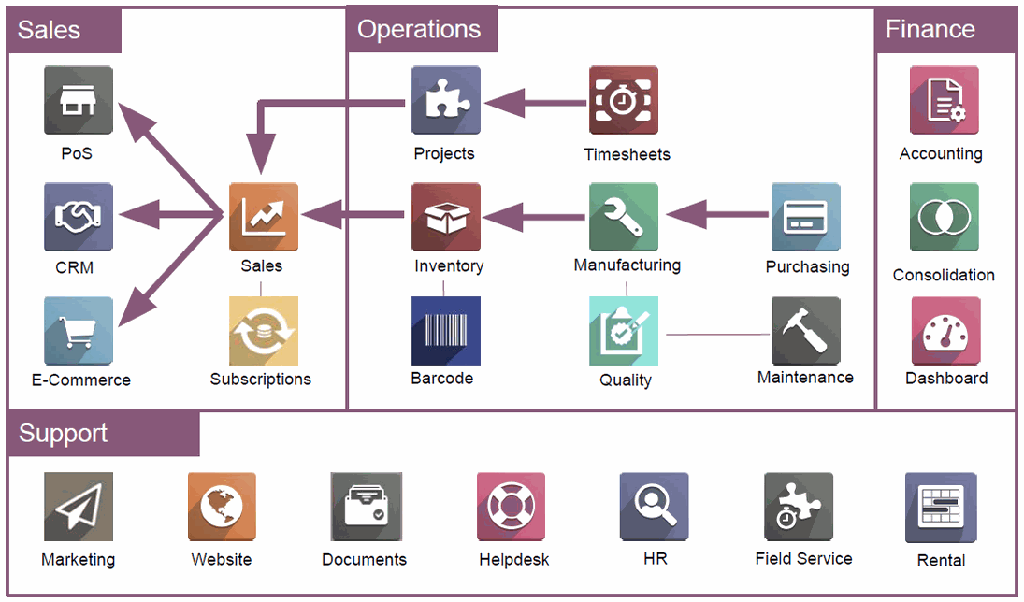
User-Friendly Interface
One of the standout features of Odoo ERP is its user-friendly interface. The platform is designed to be intuitive, ensuring that employees at all levels can navigate and utilize the system with ease. A well-organized dashboard provides a clear overview of key metrics and tasks, helping users stay on top of their responsibilities.
Customizable Modules
Odoo’s modular nature is a significant advantage for small businesses. Each module can be customized to meet specific business requirements, whether it’s adding new fields, modifying workflows, or integrating third-party applications. This customization ensures that the ERP system aligns perfectly with the unique needs of the business.
Real-Time Reporting
Odoo ERP provides real-time reporting capabilities, allowing businesses to generate accurate and up-to-date reports on various aspects of their operations. These reports can include sales performance, inventory levels, financial statements, and customer interactions. Real-time insights empower business owners and managers to make informed decisions quickly.
Seamless Integration
Odoo ERP seamlessly integrates with a wide range of third-party applications and services. Whether it’s payment gateways, shipping carriers, or e-commerce platforms, Odoo ensures smooth data flow across systems. This integration capability extends the functionality of the ERP system and enhances overall efficiency.
Mobile Accessibility
In an era where remote work and on-the-go access are increasingly important, Odoo ERP provides mobile accessibility. The platform can be accessed from smartphones and tablets, enabling users to manage business operations from anywhere. This flexibility is particularly beneficial for business owners and field staff who need to stay connected while away from the office.
Enhanced Security
Data security is a top priority for any business. Odoo ERP offers robust security features to protect sensitive business information. These include user access controls, data encryption, and regular backups. By ensuring that data is secure, businesses can focus on growth without worrying about potential security breaches.
How to Get Started with Odoo ERP
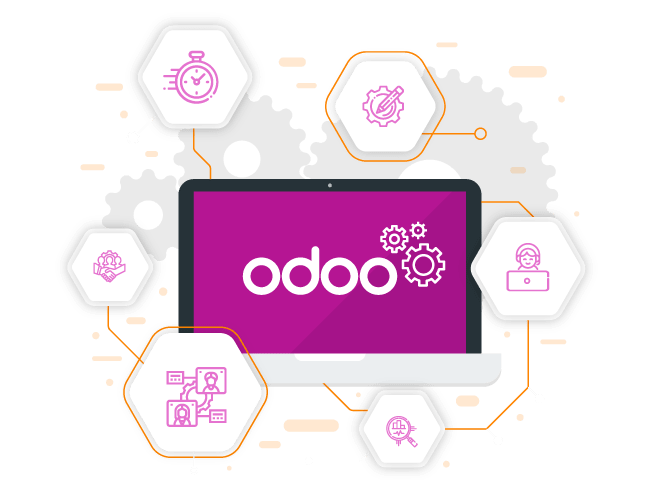
Assessing Business Needs
Before implementing Odoo ERP, it is essential for businesses to assess their specific requirements. Understanding which modules are necessary and how they will be used can help in designing a tailored system that maximizes efficiency.
Choosing the Right Plan
Odoo offers various plans to cater to different business sizes and needs. Small businesses should carefully evaluate these plans and choose one that provides the required features without exceeding the budget. A detailed comparison of available options can assist in making an informed decision.
Implementation and Training
Successful ERP implementation involves thorough planning and training. Businesses should work with experienced Odoo partners to ensure a smooth setup process. Additionally, investing in comprehensive training for employees ensures that they are equipped to make full use of the system’s capabilities.
Ongoing Support and Maintenance
Post-implementation support is crucial for the long-term success of the ERP system. Regular updates, troubleshooting, and maintenance services provided by Odoo partners or internal IT teams will ensure that the system remains efficient and up-to-date.
Price Plans of Odoo ERP
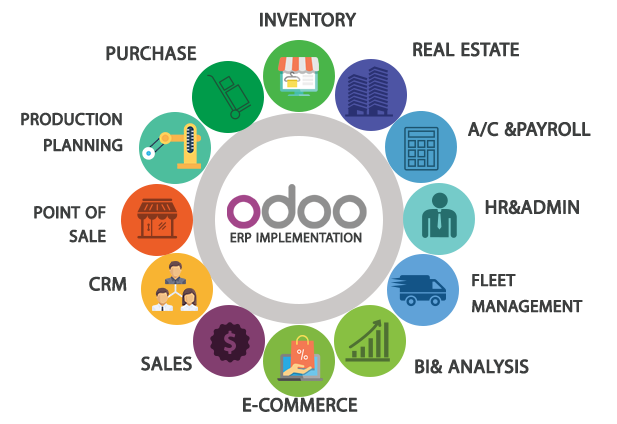
Odoo ERP offers a range of price plans designed to accommodate diverse business needs and budgets. Understanding these pricing options is vital to making an informed decision that aligns with the financial constraints and operational requirements of small businesses.
Community Edition
The Community Edition of Odoo ERP is open-source and free to use. This version provides basic functionalities and is ideal for businesses that have limited requirements and are looking to explore Odoo ERP without incurring initial costs. While it lacks some advanced features present in the Enterprise Edition, it still offers a robust platform for small businesses to manage their core processes.
Enterprise Edition
The Enterprise Edition comes with a comprehensive set of advanced features and functionalities that cater to the more intricate needs of growing businesses. Subscription-based, this edition offers various plans depending on the number of users and modules required:
- Standard Plan: This plan includes essential modules such as sales, CRM, project management, and accounting. It is suitable for small to medium-sized businesses looking for a balanced feature set without extensive customization.
- Custom Plan: For businesses with specific needs, the Custom Plan allows for a higher degree of personalization. Companies can select only the modules they require and add custom features, ensuring that they pay only for what they use.
- Enterprise Cloud Plan: This offering eliminates the need for self-hosting by providing cloud-based deployment. It includes all the benefits of the Enterprise Edition with the added advantage of cloud storage, data backups, and remote accessibility.
Additional Costs
While the base subscription fees provide access to the Odoo ERP platform, businesses should also consider additional costs such as implementation services, custom development, data migration, and ongoing support. Working with experienced Odoo partners can help in accurately estimating these expenses and planning the budget accordingly.
By carefully reviewing the different price plans and understanding the associated costs, small businesses can choose the Odoo ERP solution that best fits their operational needs and financial considerations.
Comparison with Competitors
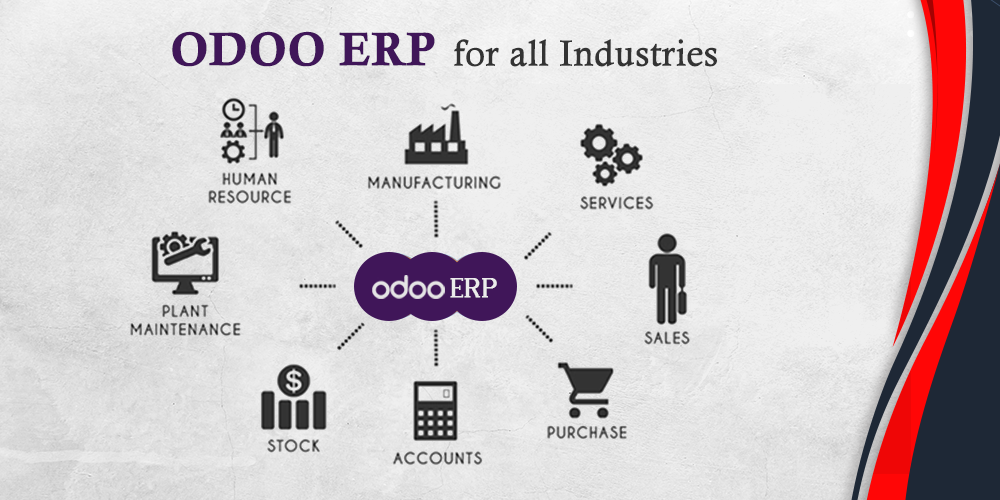
Selecting the right ERP system involves comparing Odoo ERP with its competitors to fully understand the strengths and weaknesses of each platform. Here’s a look at how Odoo ERP measures up against some popular alternatives like SAP, Oracle NetSuite, and Microsoft Dynamics 365:
Odoo vs. SAP
Functionality: SAP ERP is renowned for its comprehensive feature set tailored for large enterprises with intricate needs, including advanced analytics and supply chain management. Odoo, while versatile and robust, is more modular and is a preferred choice for small to medium-sized businesses due to its scalability and ease of customization.
Cost: Odoo offers more flexible pricing plans, including a free Community Edition, making it accessible for businesses with tight budgets. In contrast, SAP is significantly more expensive, which can be prohibitive for smaller organizations.
Ease of Use: Odoo is known for its user-friendly interface and straightforward implementation process, which can be handled by smaller in-house teams. SAP often requires considerable investment in training and dedicated IT resources.
Odoo vs. Oracle NetSuite
Cloud Capabilities: Both Odoo and Oracle NetSuite offer strong cloud-based solutions. However, Odoo provides cloud options at a more affordable rate, which can be crucial for cost-conscious small businesses.
Customization: Odoo’s open-source nature allows extensive customization, giving businesses the flexibility to tailor the system to their specific needs. Oracle NetSuite also offers customization but typically involves higher costs and more complex processes.
Industry Focus: Oracle NetSuite has a strong foothold in industries such as e-commerce, professional services, and wholesale distribution. Odoo, on the other hand, offers a versatile platform that can be adapted to a broader range of industries through its modular structure.
Odoo vs. Microsoft Dynamics 365
Integration: Microsoft Dynamics 365 seamlessly integrates with other Microsoft products like Office 365 and Azure, which can be a significant advantage for businesses already within the Microsoft ecosystem. Odoo offers extensive integration capabilities with a variety of third-party applications, making it highly adaptable to different business environments.
User Experience: Odoo ERP is praised for its intuitive interface and ease of use, which can significantly reduce the learning curve. Microsoft Dynamics 365, while powerful, often requires more extensive training and support due to its complex features.
Scalability: Both systems scale well with business growth. While Microsoft Dynamics 365 is designed to handle larger enterprise needs, Odoo’s modular approach allows growing businesses to incrementally add functionalities as necessary, without the need for a complete system overhaul.
Case Studies and Success Stories

Several small businesses have benefited from implementing Odoo ERP. Here are some examples:
Case Study 1: GreenTech Solutions
Background: GreenTech Solutions, a small but rapidly growing company specializing in eco-friendly products, faced challenges in managing their expanding operations. With multiple sales channels, a growing inventory, and a need for detailed financial tracking, their existing systems were becoming increasingly cumbersome and inefficient.
Solution: GreenTech Solutions decided to implement Odoo ERP to centralize and streamline their operations. They adopted modules for sales, inventory, and accounting.
Results:
- Streamlined Operations: By integrating their sales, inventory, and accounting processes into a single system, GreenTech was able to eliminate duplicate data entry and reduce errors.
- Improved Inventory Management: Real-time inventory tracking helped them maintain optimal stock levels, reducing both overstock and stockouts.
- Enhanced Financial Accuracy: The accounting module provided detailed financial insights, helping the company make informed budgeting and investment decisions.
- Increased Efficiency: Automation of routine tasks allowed employees to focus on strategic initiatives, leading to better customer service and higher satisfaction levels.
Case Study 2: Artisan Coffee Roasters
Background: Artisan Coffee Roasters, a boutique coffee company, needed a robust solution to manage their production, sales, and customer relationships. Their manual processes were not scalable, particularly as they opened new retail locations and expanded their online presence.
Solution: They selected Odoo ERP to integrate their production management with sales and CRM modules.
Results:
- Integrated Production and Sales: The production management module seamlessly connected with sales, ensuring that inventory levels were automatically updated with each sale.
- Enhanced Customer Relationships: The CRM module helped track customer interactions, leading to improved customer retention and targeted marketing efforts.
- Operational Visibility: The comprehensive reporting tools provided transparency across various operations, enabling more effective management and strategy planning.
- Scalable Growth: The flexibility of Odoo ERP allowed Artisan Coffee Roasters to easily add new modules as they expanded, ensuring continued efficiency without major system overhauls.
Conclusion
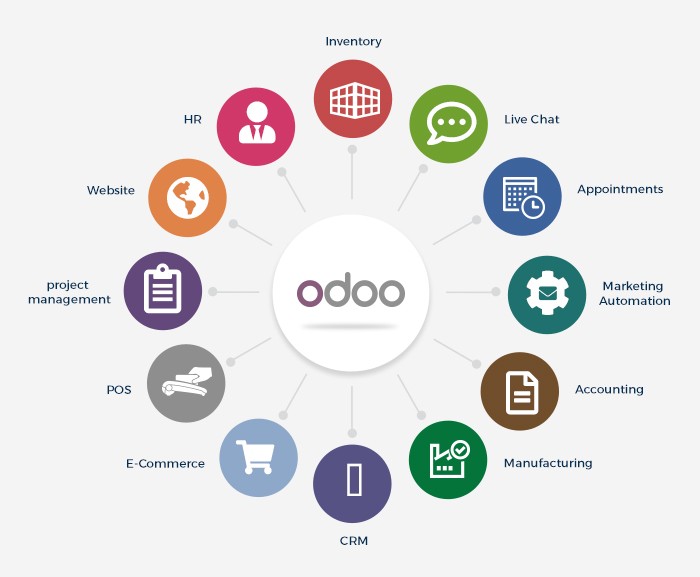
Implementing Odoo ERP has proven to be a game-changer for many small businesses across various industries. With its customizable modules, user-friendly interface, and extensive integration capabilities, Odoo supports businesses in building efficient operations and driving growth. Whether it’s enhancing sales performance, improving project management, or streamlining manufacturing processes, the benefits are substantial and demonstrable.
As small businesses continue to embrace digital transformation, platforms like Odoo ERP will remain pivotal in their success. Future advancements and updates to the software will likely introduce even more innovative features, ensuring that Odoo ERP stays ahead of industry needs. By investing in Odoo ERP, small businesses are not just implementing a system, but are fostering a foundation for sustainable growth and increased profitability.

